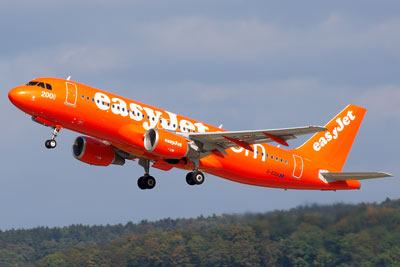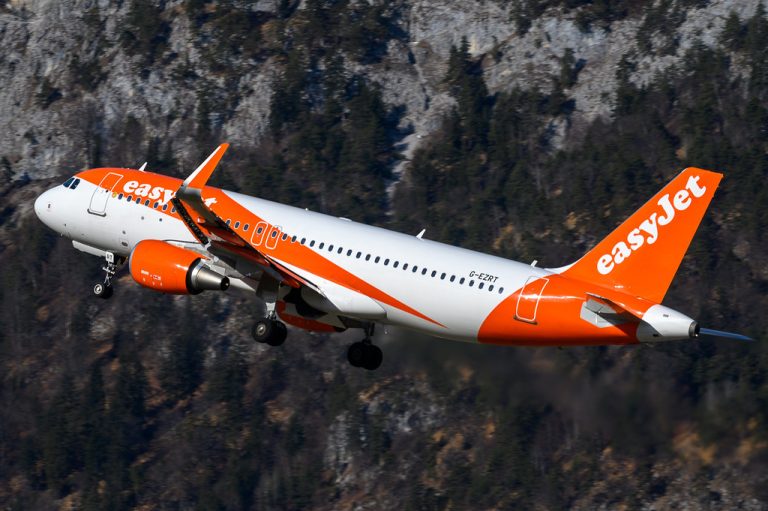Easyjet Plc (LON:EZJ), today published a trading update.
Summary
easyJet will deliver a strong performance in the fourth quarter with robust customer demand driving outperformance in both our passenger and ancillary revenue growth, and strong profitability. Disruption across Europe continues to be an industry wide issue and is having an impact on revenue, cost and operational performance, with the main causes being European industrial action and air traffic restrictions. We have seen improved performance in Tegel reducing the expected headline loss to around £115 million, along with further savings in non-headline integration costs to circa £45 million.
Despite the impact of disruption, easyJet expects to deliver Full Year 2018 headline profit before tax of between £570 million and £580 million. This is in the upper half of previous guidance.
Revenue
Passenger1 numbers for the full year excluding Tegel are expected to increase by 5.4% to circa 84.6 million, driven by an expected increase in capacity2 of 4.2% to circa 90.3 million seats which was lower than originally planned due to the level of external disruption. Load factor3 for the full year is expected to increase by 1.0 percentage points to 93.6%.
Total revenue per seat excluding Tegel operations at constant currency for the full year is expected to increase by circa 6.5%. Total revenue per seat excluding Tegel operations at constant currency for the second half is expected to increase by circa 5.0%, at the high end of previous guidance.
Total reported revenue including Tegel is expected to be circa £5,895 million.
Cost
Headline cost per seat excluding fuel at constant currency excluding Tegel is expected to have increased by circa 3.8% for the full year, higher than previously expected, due to sustained high levels of disruption. Underlying cost control remains solid and in line with expectations as easyJet continues to deliver significant benefits from its cost programme. easyJet experienced an increase in cancellations compared to the third quarter of which the significant majority were due to third party industrial action, air traffic control restrictions or severe weather across Europe.
Total headline cost excluding fuel and including Tegel is expected to be around £4,135 million.
easyJet’s total fuel cost including Tegel for Full Year 2018 is expected to be around £1,185 million, including an expected additional £15 million cost compared to previous guidance as a result of a US dollar foreign exchange impact and carbon Emissions Trading System (ETS) costs.
Berlin Tegel
easyJet is progressing well with implementing its operational delivery and building its market presence in Berlin, whilst flying an inherited inefficient schedule that had the biggest impact in the peak summer season. Headline losses for Tegel operations for the year are expected to be around £115 million for the full year, an improvement on previous guidance. easyJet expects to have flown around 4.9 million seats during the financial year and load factors remain strong, at circa 85% for the fourth quarter, highlighting positive customer uptake. easyJet also expects a further reduction in non-headline costs for the year to circa £45 million.
easyJet’s expected total loss for Tegel operations has now improved to be in line with its original guidance of around £160 million.
Commercial IT platform
Over the past three years easyJet has been investing in its commercial IT platform which has delivered revenue benefits through significant improvement in the customer facing website and seating capability, as well as improvements in underlying resilience and control systems. However, easyJet has now made the decision to change its approach to technology development through better utilisation and development of existing systems on a modular basis, rather than working towards a full replacement of our core commercial platform. As a result of this change in approach, we are recognising a non-headline charge of around £65 million relating to IT investments and associated commitments we will no longer require. easyJet will continue to invest in its digital and eCommerce layers that will enable it to continue to offer a leading innovative, revenue enhancing and customer friendly platform.
Balance sheet
easyJet continues to have an industry leading balance sheet and expects a strong net cash position at the end of the 2018 financial year. In August easyJet further strengthened its liquidity position by entering into a new two year £250 million unsecured Revolving Credit Facility (RCF). This is in addition to the existing RCF of $500 million. The terms of the new RCF reflect no financial covenants and it has the flexibility to be increased by a further £50m.
Dividend
easyJet intends to declare a full year dividend consistent with its stated policy of paying a dividend equivalent to 50% of headline earnings per share.
All Financial Year 2018 figures provided are subject to audit and final adjustment as we complete the year-end process.
Outlook (based on existing accounting standards and including Tegel)
For the year ending 30 September 2019, and using as a base its total FY18 headline performance, easyJet expects:
· Full Year capacity to grow by circa 10% to around 105 million seats. Approximately half of this represents the annualisation of Berlin flying, as well as the benefit of fleet up-gauging in summer 2018 and is therefore weighted towards the first half
· H1 revenue per seat at constant currency to decrease by low to mid-single digits. This reflects a continuation of positive trading offset by a number of one-off revenue benefits from H1 2018 including the bankruptcies of Monarch and Air Berlin, as well as the impact from Ryanair’s winter flight cancellations. The benefit of Easter will shift from the first half into the second half of the year.
· Full Year headline cost per seat excluding fuel at constant currency to be flat, which represents an expected decrease in underlying cost per seat excluding fuel at constant currency offset by inflationary airport and crew pay deals and investment in the business.
· Full Year 2019 unit fuel4 bill is likely to be £55 million to £105 million adverse. The total reported fuel bill is expected to be c.£1.48 billion
· Foreign exchange5 movements are expected to have a circa £10 million net negative impact on headline profit before tax
· easyJet targets to break even in Berlin in Financial Year 2019 and this is included in the above guidance5
easyJet plans to provide further details on its medium term outlook as part of our Full Year 2018 results announcement on Tuesday 20th November 2018.
Commenting, Johan Lundgren, easyJet Chief Executive said:
“easyJet expects to deliver a strong performance in both Q4 and the full year, driven by better-than-expected growth in passenger and ancillary revenues, as well as reduced losses at our Tegel operation. We now expect our headline profits for the year to be between £570m and £580m, at the top half of our guidance range. This has been achieved despite higher costs caused by disruption due to third party industrial action and severe weather. However, we have benefited from a number of one-off events in 2018, including the bankruptcies of Monarch and Air Berlin, as well as Ryanair cancellations.
“In the fourth quarter we made the decision to change our approach to technology development. Rather than a full replacement of our core commercial platform, we will be investing in better utilisation and development of existing systems on a modular basis. This has resulted in a non-headline charge of £65m as we repurpose our systems to create a better service for our customers.
“We look forward to FY 19 as we continue to invest in the long-term strategic initiatives that we set out at the half year.”
New accounting standards
The adoption of new accounting standards IFRS 15 Revenue from contracts with customers and IFRS 16 Leases on 1 October 2018 will be on a prospective basis meaning FY18 results will remain as reported.
The expected impact of IFRS 15 and IFRS 16 in FY19 will be as follows:
· Under IFRS 15, certain revenue streams, principally administration and change fees, will be delayed from the date of booking to the date of flight. The anticipated full year impact of this change is expected to be immaterial to total revenue. Additionally a proportion of compensation payments made to customers in respect of flight delays, previously recorded wholly within expenses, will be offset against revenues. This presentational change will have no impact on the overall profit for the year.
· The adoption of IFRS 16 is expected to result in the recognition of circa £0.5 billion of right of use assets and £0.5 billion of lease liabilities. It is not expected to have a material impact on profit before tax in the year of transition.
The impact of new accounting standards are subject to audit and final adjustment as we complete the year-end process.









































